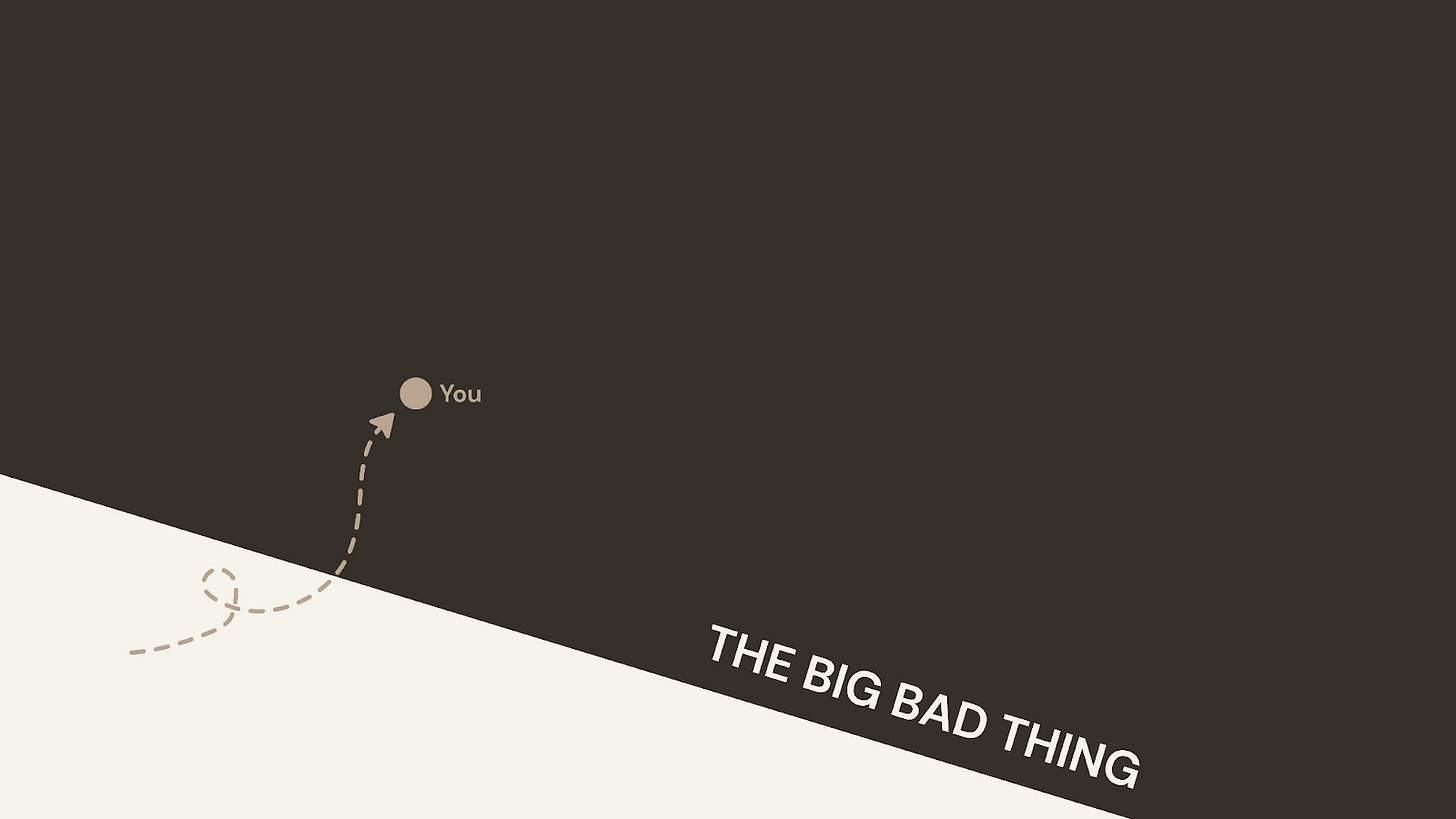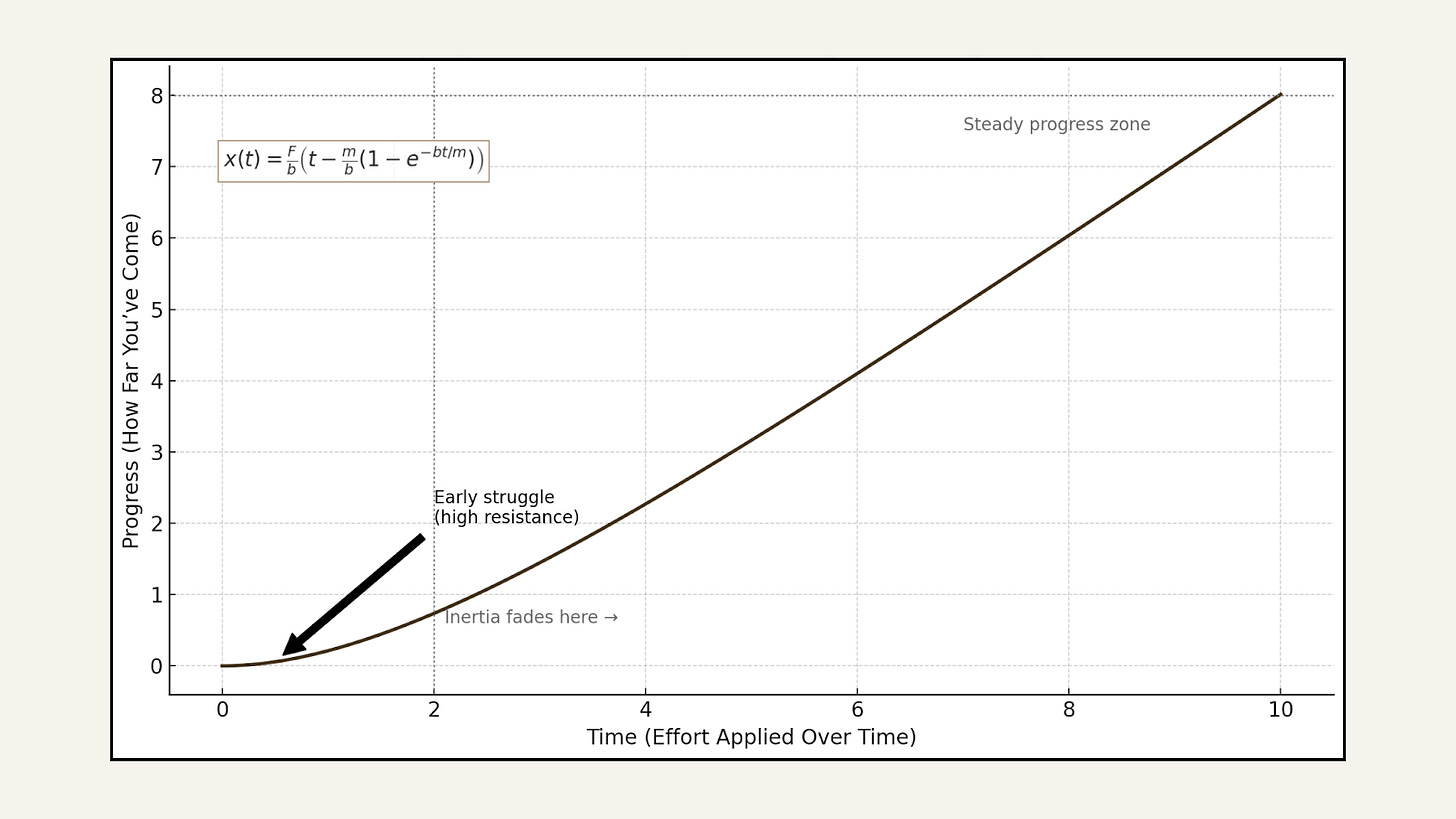The principles of grace: self-growth for sceptics
Why I’ve found myself speaking about self-growth more than any other sort of growth, and why I'll move on to talk about other things after this essay
1. Life is a current.
Like most Indians, I was raised being taught about ‘nazar’ (नज़र / نظر ) – the idea that self-aggrandisement begets envy, which in turn begets misery. This makes talking about self-growth in specific terms – with oneself as the object that’s being grown by the subject, also oneself – difficult.
And then there’s reams upon reams of myths about those who choose to live life without humility. For instance, there’s Narcissus, who chanced upon his own reflection in a lake and, consumed by self-love, died transfixed. There’s Icarus, whose name has become the byword for hubris. The myth goes: when Icarus and his father, Daedalus, the master engineer, were being held captive by Minos, the father crafted wax wings for them both to fly and escape. Upon giving him his wings, Daedalus gave his son one instruction: do not to fly too close to the sun. Mid-flight, Icarus, carried away with his new superpower, ignored his father’s instructions and soared; the sun melted his wings and he crashed to his death. ‘Ghamand’ (घमंड), as it’s called in Hindi. Arrogance.

Finally, there’s the money-grubbing self-improvement industry. I’ve always been deeply sceptical of the genre, and its industrialisation in the YouTube age has only deepened my scepticism. It’s particularly worrying to see self-improvement peddled by those whose entire careers appear to consist entirely of peddling self-improvement. There’s a bunch for each subculture. The nutraceuticals gurus, the red-pilled men-go-their-own-way gurus, the holistic living gurus, the bite-through-the-pain gurus, the stoicism-repackaged gurus, the throw-away-your-phone gurus, the become-a-millionaire-influencer-gurus. Millions minted off the vulnerable in exchange for the promise of a cure to our modern alienated lives.
If all of these reasons – the fear of nazar, the Greek myths, a distaste for the self-improvement industry – add up to my discomfort writing about self-growth, my worldview renders writing about it a little self-contradictory. Life, I believe, is a current that carries us. Not my life, but life – all of it, without possessiveness. We’re born immersed in it; when we shuffle off this mortal coil, we are no longer immersed. The paradox of consciousness is that we chart our own individual histories and imagined futures as subjects, as if we have an outsized impact on our outcomes. Yet we’re constantly reminded of our own insignificance. We’re constantly shown to be – in most cases – objects. Conscious beings carried by this current, exerting no control over its direction. The only way in which we exert any control – the only sense in which we appear to have anything approaching subjectivity – is in how we choose to be carried by it: is it with grace?
That is my humble, but specific, view on the nature of existence, the way I resolve the subject-object paradox. It borrows from the Buddha, Albert Camus (‘one must imagine Sisyphus happy’), Simone de Beauvoir, my parents (‘you determine the work you do, not the outcome of that work’), Gayatri Spivak’s interpretations of postmodernism, and Heisenberg’s uncertainty principle – the philosophical inspirations for my worldview. My primary conclusion is simple. Live with humility: do not congratulate yourself for your own growth, even if you enjoy it. Congratulate yourself for the grace you display.
I have been on a journey of growth over the past year. This growth has allowed me to do things that have been tremendously rewarding – grow enterprises, write regularly, make music – where a year ago I was miserable. If you believe, like I do, that life is a current, you, like me, likely see yourself as ‘object’ far more often than as ‘subject’. And you, like me, see the universe as being largely uncaring about matters to do specifically with you. In such a universe, bad times come just as good times do – with little forewarning. In that context, documenting the principles of grace may serve as the best guide for growth for the next time you’re faced with a big bad thing that stands between you and perceptible growth.
2. The only way past is through.
There’s no avoiding the big bad thing. Or at least there’s no way to avoid the big bad thing while also allowing yourself to be carried by life’s current gracefully. It’s sad, but it’s true. It’s especially sad if the big bad thing in your way is not your fault. It often isn’t. Often it might appear that your big bad thing is bigger and badder than the big bad things of those around you. Sometimes it is, other times it isn’t – it’s impossible for you to know because it is impossible to describe your own experience of consciousness from outside of your own experience of consciousness. It’s a mind-bender: you’ll never know if you’ve been unfairly singled out to experience the universe’s uncaring nature or if you’re uniquely weak in the face of the challenges that result from the universe’s uncaring nature. You just can’t know. You’re limited by language, you’re limited by your experience of consciousness.
So there’s this thing. There’s no way around it. It’s an infinitely wide wall of viscous grease that pushes back against you. The big thing to recognise and truly accept is this: the only way past is through. Acceptance is the toughest part, the physics of it is fairly easy to explain. The acceptance – that’s the first thing that takes work. Once you reach acceptance, here’s the physics of it. The thicker the wall (the bigger the thing), the longer it takes. The more viscous the grease (the badder the thing), the longer it takes. The more help you receive, the more force you can exert against it. The more force you exert against it, the quicker the journey. Your journey through – the ‘how’ of it all – takes the form of a kinematic equation that is easy to chart.
Put simply, even if you summon the strength and the support needed to force your way through, progress will start off slow. First you’ll have to overcome your own inertia, then the grease will push back against you, and as reward for continuing the push, you’ll be engulfed by it. But if you keep on applying that force consistently (that’s the second thing that takes work after acceptance), you will eventually overcome your own inertia, you’ll overcome the grease’s viscosity, you’ll make steady progress, you’ll come out the other end. In the equation that determines how you go through the big bad thing, there’s only one factor that’s in your control: the force you apply.
3. Pick the graceful way.
I don’t know the road to success, but I do believe it’s the same as the graceful way. If that’s true, I know the surest path to failure: it’s believing these three ideas at the same time.
the universe is unfair
particularly towards me, and
there’s nothing I can do about it.
That’s all object and no subject. It’s no different from holding these three ideas at the same time.
the world is an oyster
that’s specifically mine, and
there’s nothing anyone else can do about it.
All subject and no object.
If you believe this premise as I have at multiple points in my past – the world is unfair, particularly towards me, and there’s nothing I can do about it – you are exhausted of the ability to apply any sort of positive force against big big bad things. You will not move. To quote from David Foster Wallace’s 2005 commencement speech to the graduating class of Kenyon College, published later as This is Water.
Learning how to think really means learning how to exercise some control over how and what you think. It means being conscious and aware enough to choose what you pay attention to and to choose how you construct meaning from experience. Because if you cannot exercise this kind of choice in adult life, you will be totally hosed.
With this essay out of the way, I will move on to other, less abstract, things. I have twenty songs I’ve made over the past four years that I would like to release. As an experiment, I’m going to try and see if I can release them without putting them out on Spotify. I’ll tell you all about it.




